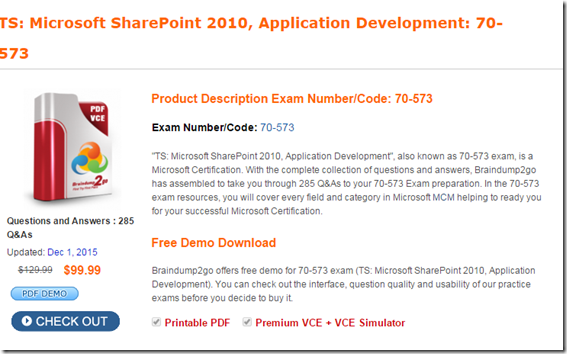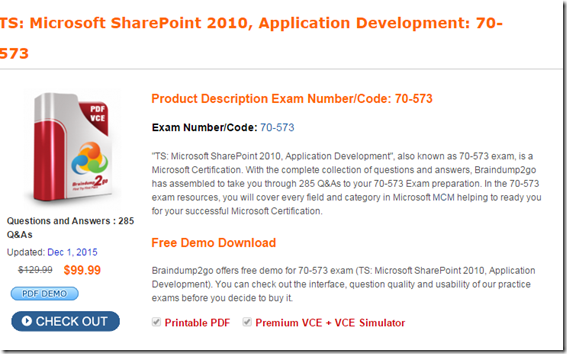MICROSOFT NEWS: 70-573 Exam Questions has been Updated Today! Get Latest 70-573 VCE and 70-573 PDF Instantly! Welcome to Download the Newest Braindump2go 70-573 VE&70-573 PDF Dumps: http://www.braindump2go.com/70-573.html (285 Q&As)
2015 Latest released Microsoft Official 70-573 Practice Exam Question Free Download From Braindump2go Now! All New Updated 285 Questions And Answers are Real Questions from Microsoft Exam Center!
Exam Code: 70-573
Exam Name: TS: Microsoft SharePoint 2010, Application Development
Certification Provider: Microsoft
Corresponding Certifications: MCPD, MCPD: SharePoint Developer 2010, MCTS, MCTS: Microsoft SharePoint 2010, Application Development
70-573 Dumps,70-573 Latest Dumps,70-573 Dumps PDF,70-573 Study Guide,70-573 Book,70-573 Certification,70-573 Study Material,70-573 Exam Questions,70-573 Training kit,70-573 eBook,70-573 Exam Prep,70-573 Braindump,70-573 Practice Exam,70-573 Practice Test,70-573 Practice Questions,70-573 Preparation Material,70-573 Preparation Guide

QUESTION 141
You need to connect two Web Parts by using the IWebPartRow interface.
Which method should you use?
A. GetFieldValue
B. Dataltem
C. GetRowData
D. GetTableData
Answer: C
Explanation:
Explanation:
MNEMONIC RULE: “iWebPartRow = GetRowData”
Returns the data for the row that is being used by the interface as the basis of a connection between twoWebPart controls.
IWebPartRow.GetRowData Method
http://msdn.microsoft.com/en-us/library/system.web.ui.webcontrols.webparts.iwebpartrow.getrowdata.aspx
QUESTION 142
You create a Web Part by using Microsoft Visual Studio 2010.
You need to execute SPDisposeCheck.exe before the Web Part is deployed.
What should you do?
A. Configure a pre-deployment command line.
B. Configure SPDisposeCheck.exe as an external tool.
C. Change the configuration from Active (Debug) to Release.
D. Change the active deployment configuration to No Activation.
Answer: A
Explanation:
MNEMONIC RULE: “before deployed = pre-deployment”
How to: Set SharePoint Deployment Commands
http://msdn.microsoft.com/en-us/library/ee231534.aspx
QUESTION 143
You create a SharePoint solution by using Microsoft Visual Studio 2010.
The SharePoint solution contains a third-party assembly.
You need to deploy the third-party assembly to the Global Assembly Cache (GAC).
What should you use?
A. a SharePoint mapped folder
B. the active deployment configuration
C. the Feature Designer
D. the Package Designer
Answer: D
Explanation:
MNEMONIC RULE: “Package Designer for GAC”
How to add assemblies into GAC/web application’s bin folder using WSPs created using Visual studio 2010’sSharePoint projects.
http://girishm.blog.com/2010/10/19/how-to-add-assemblies-into-gac-web-applications-bin-folder-using-wspscreated-using-visual-studio-2010s-sharepoint-projects-2/
The package contains features and other assets and is used when you deploy solutions to SharePoint.
The package is also where the assembly deployment location is determined.
Visual Studio 2010 introduces a package designer, which makes viewing and managing packages mucheasier.
Visual Studio 2010 Tools for SharePoint Development
http://msdn.microsoft.com/en-us/magazine/ee309510.aspx
QUESTION 144
You create a console application to manage Personal Sites.
The application contains the following code segment. (Line numbers are included for reference only.)
01 Dim siteCollection As New SPSite(“http://moss”);
02 Dim profileManager As New
serProfileManager(ServerContext.GetContext(siteCollection));
03 Dim profile As UserProfile = profileManager.GetUserProfile(“domain\username”);
04 Dim personalSite As SPSite = profile.PersonalSite;
05
06 siteCollection.Dispose();
You deploy the application to a SharePoint site.After deploying the application, users report that the site loads slowly.
You need to modify the application to prevent the site from loading slowly.
What should you do?
A. Remove line 06.
B. Add the following line of code at line 05.
personalSite.close();
C. Add the following line of code at line 05.
personalSite.Dispose();
D. Change line 06 to the following code segment.
siteCollection.close();
Answer: C
Explanation:
MNEMONIC RULE: “Dispose”
Disposing Objects
http://msdn.microsoft.com/en-us/library/ee557362.aspx
QUESTION 145
You need to create a Web Part that will store and retrieve information for the current subsite. Which object should you use?
A. SPContext.Current.Site.RootWeb.AllProperties
B. SPContext.Current.Site.RootWeb.Configuration
C. SPContext.Current.Web.Configuration
D. SPContext.Current.Web.Properties
Answer: D
Explanation:
MNEMONIC RULE: “information is in Web.Properties”
SPContext.Current.Web is SPWeb object.
Properties is the SPPropertyBag object with the metadata for the website.
SPWeb.Properties Property
http://msdn.microsoft.com/en-us/library/microsoft.sharepoint.spweb.properties.aspx
QUESTION 146
You are creating a Web Part that will be deployed as a sandboxed solution.
You need to ensure that the Web Part can write debugging information to the SharePoint trace logs.
Which class should the logging component inherit?
A. SPDelegate
B. SPLog
C. SPPersistedObject
D. SPProxyOperation
Answer: D
Explanation:
MNEMONIC RULE: “sandboxed solution needs SPProxyOperation”
You can implement your full-trust functionality in classes that derive from the SPProxyOperation abstract classand deploy the assembly to the global assembly cache.
These classes expose a full-trust proxy that you cancall from within the sandbox environment.
Full-trust proxies can provide a useful way to expose logging and configuration functionality to sandboxedapplications.
Hybrid Approaches
http://msdn.microsoft.com/en-us/library/ff798433.aspx
QUESTION 147
You have a SharePoint site collection.
The root Web of the site collection has the URL http://intranet.
You plan to create a user solution that will contain a Web Part.
The Web Part will display the title of the root Web.
You write the following code segment for the Web Part. (Line numbers are included for reference only.)
01Dim currentSite As New SPSite(“http://intranet”)
02
03Dim currentTitle As New Label()
04currentTitle.Text = currentSite.RootWeb.Title
You add the Web Part to a page in the root Web and receive the following error message:
“Web Part Error: Unhandled exception was thrown by the sandboxed code wrapper’s Execute method in the partial trust app domain: An unexpected error has occurred.”
You need to prevent the error from occurring.
What should you do?
A. Add the following line of code at line 02.
currentSite.OpenWeb()
B. Add the following line of code at line 02.
currentSite.OpenWeb(“http://intranet”)
C. Change line 01 to the following code segment.
Dim currentSite As SPSite = SPContext.Current.Site
D. Change line 04 to the following code segment.
currentTitle.Text = currentSite.OpenWeb().Title
Answer: C
QUESTION 148
You have a Feature named Feature1.
You plan to create a new version of Feature1 that will upgrade the existing version of Feature1. You need to ensure that when Feature1 is upgraded, additional configuration data is added to the property bag of the site.
What should you do?
A. Add a <CustomUpgradeAction> element and increase the Version number of the Feature.
B. Add a <CustomUpgradeAction> element and increase the UIVersion number of the Feature.
C. Add an <ActivationDependencies> element and increase the Version number of the Feature.
D. Add an <ActivationDependencies> element and increase the UIVersion number of the Feature.
Answer: A
Explanation:
MNEMONIC RULE: “CustomUpgradeAction Version”
<CustomUpgradeAction>-Allows you to execute custom code when a Feature instance is being upgraded.
Feature.xml Changes
http://msdn.microsoft.com/en-us/library/ee537575.aspx
QUESTION 149
You have a custom site definition.
You create a custom site Feature.
You need to ensure that the Feature is activated for all new sites that are created by using the custom site definition.
What should you do?
A. Modify the Onet.xml file.
B. Modify the web.config file.
C. Add a Feature receiver to the custom site Feature.
D. Add a Feature dependency to the custom site Feature.
Answer: A
Explanation:
MNEMONIC RULE: “custom site definition = Onet.xml”
You can perform the following kinds of tasks in a custom Onet.xml file that is used for either a custom sitedefinition or a custom web template:
Specify an alternative cascading style sheet (CSS) file, JavaScript file, or ASPX header file for a sitedefinition.
Modify navigation areas for the home page and list pages.
Add a new list definition as an option in the UI.
Define one configuration for the site definition or web template, specifying the lists, modules, files, and WebParts that are included when the configuration is instantiated.
Specify Features to be included automatically with websites that are created from the site definition or webtemplate.
Understanding Onet.xml Files
http://msdn.microsoft.com/en-us/library/ms474369.aspx
QUESTION 150
You create a SharePoint solution.
You deploy the SharePoint solution by using Microsoft Visual Studio 2010.
You need to prevent the Feature that is contained in the solution from being automatically activated when you deploy the solution.
What should you configure in Visual Studio 2010?
A. the active deployment configuration
B. the build configuration
C. the pre-deployment command line
D. the startup item
Answer: A
Explanation:
MNEMONIC RULE: “deploy the solution = active deployment configuration”
How to: Edit a SharePoint Deployment Configuration
http://msdn.microsoft.com/en-us/library/ee231587.aspx
Walkthrough: Creating a Custom Deployment Step for SharePoint Projects
http://msdn.microsoft.com/en-us/library/ee256698.aspx
Want Pass 70-573 Exam At the first try? Come to Braindump2go! Download the Latest Microsoft 70-573 Real Exam Questions and Answers PDF & VCE from Braindump2go,100% Pass Guaranteed Or Full Money Back!

FREE DOWNLOAD: NEW UPDATED 70-573 PDF Dumps & 70-573 VCE Dumps from Braindump2go: http://www.braindump2go.com/70-573.html (285 Q&A)